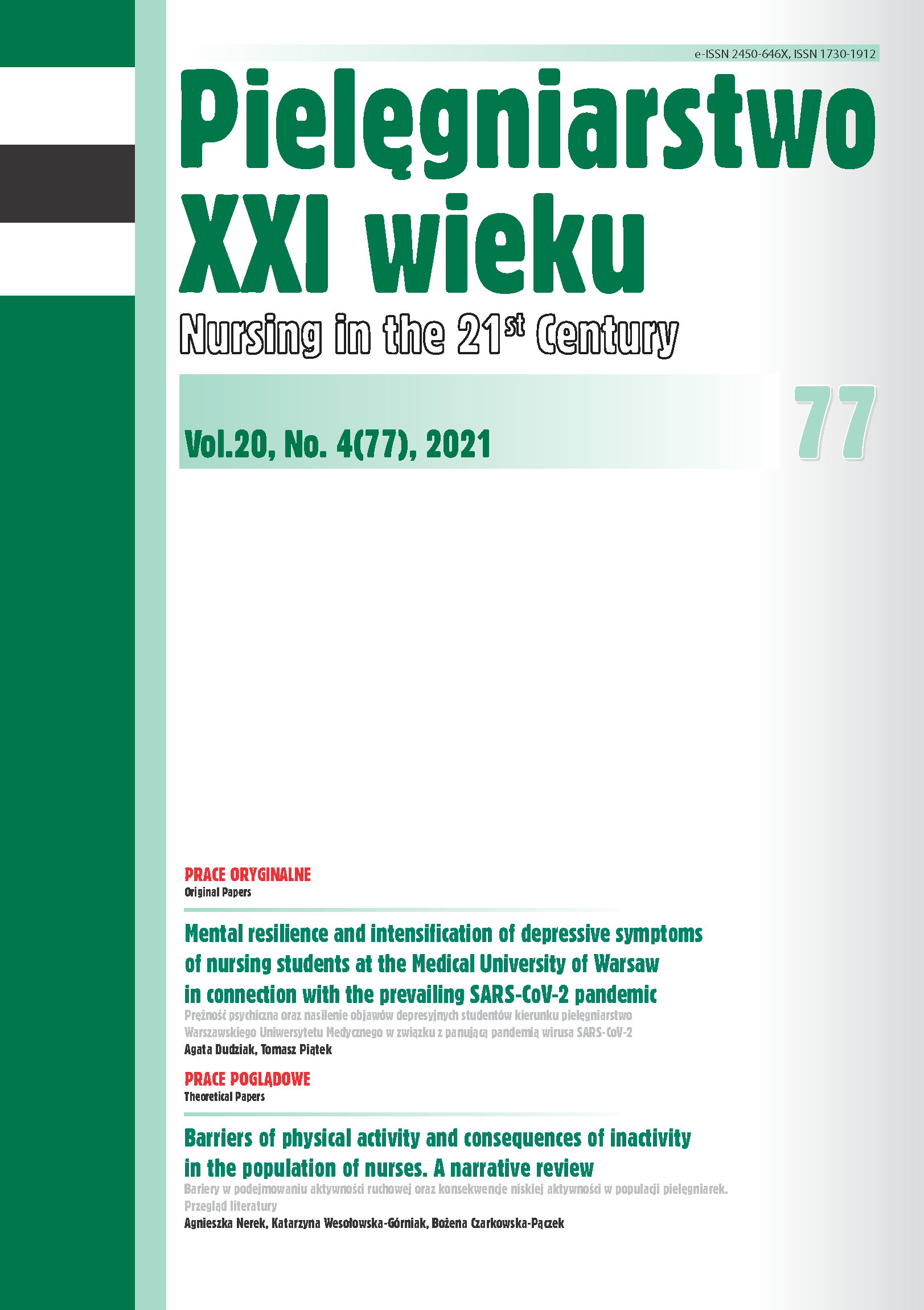Wpływ celowanych interwencji na niezaspokojone potrzeby z zakresu opieki zdrowotnej i pomocy społecznej u pacjentów z postępującą chorobą neurologiczną: interwencyjne badanie kontrolne
DOI:
https://doi.org/10.2478/pielxxiw-2021-0036Słowa kluczowe:
interwencja, potrzeba, pielęgniarka, postępująca choroba neurologiczna, wsparcieAbstrakt
WPŁYW CELOWANYCH INTERWENCJI NA NIEZASPOKOJONE POTRZEBY Z ZAKRESU OPIEKI ZDROWOTNEJ I POMOCY SPOŁECZNEJ U PACJENTÓW Z POSTĘPUJĄCĄ CHOROBĄ NEUROLOGICZNĄ: INTERWENCYJNE BADANIE KONTROLNE
Wstęp. Ważnym priorytetem świadczonej opieki jest koncentracja na jakości życia pacjentów i ich rodzin oraz troska o potrzeby biopsycho-społeczne i duchowe pacjentów.
Cel pracy. Celem było zidentyfikowanie niezaspokojonych potrzeb pacjentów i określenie wpływu ukierunkowanych interwencji na niezaspokojone potrzeby pacjentów.
Materiał i metody. Próba składała się z 151 pacjentów z postępującą chorobą neurologiczną (PChN). Do zbierania danych wykorzystano kwestionariusz NPCS.
Wyniki. Najwięcej niezaspokojonych potrzeb zidentyfikowano w obszarze rehabilitacji, zarówno pod względem częstotliwości (78,8%), jak i intensywności (73,5%), wsparcia rodziny (52,3%), zapewnienia opieki zastępczej w miejscu zamieszkania (38,4%), potrzeby opieki osobistej (35,7%) i specjalistycznego leczenia pielęgniarskiego (33,7%). Ukierunkowana interwencja zmniejszyła niezaspokojone potrzeby pacjentów włączonych do badania interwencyjnego.
Wnioski. Zrozumienie czynników, które determinują rodzaj i stopień niezaspokojonych potrzeb pacjentów z PChN, ma zasadnicze znaczenie dla zapewnienia odpowiedniej opieki wielodyscyplinarnej.
Bibliografia
1. Kavalieratos D, Corbelli J, Zhang K, et al. Association between palliative care and patient and caregivers outcomes. A systematic review and meta-analysis. JAMA. 2016; 316(20): 2104-2114.
2. Turner-Stokes L, McCrone P, Jackson D, Siegert R. The Needs and Provision Complexity Scale: measuring met and unmet needs in the community for patients with complex neurological disabilities. Neurorehabilitation and Neural Repair. 2013; 3(2): 695-704.
3. Hussain J, Adams D, Campbell C. End-of-life care in neurodegenerative conditions: outcomes of a specialist palliative neurology service. International Journal of Palliative Nursing. 2013; 19(4), 162-169.
4. Lageman S, Cash T, Mickens M. Patient-reported needs, non-motor symptoms and quality of life in essential tremor and Parkinson’s Disease. Tremor and Other Hyperkinetic Movements. 2014; 4(240): doi: 10.7916/D8RF5S4J.
5. Mansfield E, Boyes AW, Sanson-Fisher R. Quantifying the unmet needs of caregivers of people with dementia: A critical review of the quality of measures. International Journal of Geriatric Psychiatry. 2017; 32(3): 274-287.
6. Van der Eijk M, Faber M, Shamma S, Munneke M, et al. Moving towards patient-centered healthcare for patients with Parkinson’s disease. Parkinsonism & Related Disorders. 2011; 17(5): 360-364.
7. Asadi Lari M, Tamburini M, Gray D. Patients’ needs, satisfaction, and health related quality of life: towards a comprehensive model. Health Quality of Life Outcomes. 2004; 2(32): 1-15.
8. Calvert M, Pall H, Hoppitt T, et al. Health-related quality of life and supportive care in patients with rare long-term neurological conditions. Quality Life Research. 2013; 22(6): 1231-1238.
9. McColl MA, Jarzynowska A, Shortt S. Unmet health care needs of people with disabilities: population level evidence. Disability & Society. 2010; 25(2): 205-218.
10. Anderson F, Downing GM, Hill J, et al. Palliative performance scale (PPS): a new tool. Journal of Palliative Care. 1996; 12(1): 5-11.
11. Mahoney FI, Barthel D. Functional evaluation: the Barthel index. Maryland State Medical Journal. 1965; 14: 56-61.
12. Waller A, Girgis A, Lecathelinas Ch, et al. Palliative care research program, validity, reliability and clinical feasibility of a Needs Assessment Tool for people with progressive cancer. Psychooncology. 2010; 19(7): 726-733.
13. Hansen D, Larsen P, Holm L, et al. Association between unmet needs and quality of life of cancer patients: A population-based study. Acta Oncologica. 2013; 52(2): 391-399.
14. Siegert R, Jackson D, Turner-Stokes L. The Needs and Provision Complexity Scale: a first psychometric analysis using multicentre data. Clinical Rehabilitation. 2014; 8(7): 687-695.
15. Buetow S, Giddings L, Williams L, et al. Perceived unmet needs for health care among Parkinson’s Society of New Zealand members with Parkinson’s disease. Parkinsonism & Related Disorders. 2008; 14(6): 495-500.
16. Lee J, Kim Y, Kim S, et al. Unmet needs of people with Parkinson’s disease: A cross‐sectional study. Journal of Advanced Nursing. 2019; 75(12): 3504-3514.
17. Van Walsem M, Howe E, Ruud G, et al. Health-related Quality of Life and Unmet Healthcare Needs in Huntington’s Disease. Health and Quality of Life Outcomes. 2017; 7(15): 1-6.
18. Holmoy A, Johannssen C, Hope S, et al. Uncovering health and social care needs among myotonic dystrophy patients. Acta Neurologica Scandinavica, 2019; 139(6): 526-532.
Pobrania
Opublikowane
Numer
Dział
Licencja
Prawa autorskie (c) 2021 Autorzy

Utwór dostępny jest na licencji Creative Commons Uznanie autorstwa – Użycie niekomercyjne – Bez utworów zależnych 4.0 Międzynarodowe.




